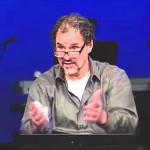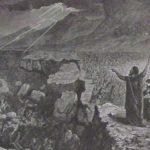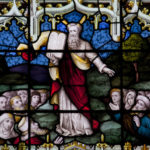We run our website the way we wished the whole internet worked: we provide high quality original content with no ads. We are funded solely by your direct support. Please consider supporting this project.
How NOT to be Christ-Centered: A Review of God With Us – Part II
In Part I of my review of Scott Oliphint’s God With Us we saw that Oliphint is attempting to reframe divine accommodation in a Christ-centerd way. Yet, while he affirms that “Christ is the quintessential revelation of God,” he went on to espouse a classical view of God that was anchored in God’s “aseity,” not Christ. What then does Oliphint mean when he says he wants to construct a Christ-centered understanding of accommodation?
Once he fleshes out his classical understanding of God, we discover that what Oliphint means when he says his approach will be Christ-centered is that he wants to use the “hypostatic union” (referring to the union of God and humanity in Christ) that was articulated at the Council of Chalcedon (454AD) as the paradigm for understanding divine accommodation (see esp. 139-56). In this light, I think it’s fair to describe Oliphint’s project as being not so much centered on Christ as it is centered on the Council of Chalcedon – indeed, centered on a particular interpretation of Chalcedon, as we’ll see below. As Oliphint interprets it, the “hypostatic union” worked out in this council involved God – the immutable and impassible God he has just fleshed out – becoming a full human without thereby surrendering any of his essential divine attributes. “God did not (indeed, could not) give up any essential aspect of his deity in order to assume human nature,” he avers (151).
One of the strategies Oliphint employs to render this hypostatic union coherent is a “reduplicative strategy” that involves a type of reasoning that proceeds along the lines of “X as A is N” (151-54). As a full human, Jesus possessed all the attributes of a human, while as God, Jesus possessed all the attributes of God. As a full human, for example, Jesus was ignorant of certain things, while as God Jesus was omniscient ( 154). Consequently, he later notes, “what we have in the person of Christ is a mysterious unity, a unity in which there can be real ignorance together with exhaustive knowledge” (178). So too, as a full human, Jesus was limited in space, while as God, Jesus was omnipresent. All of this is simply a way of articulating the Chalcedonian Creed that in Christ, “we have the perfect union of God and creation in the uniting of the two natures in one person.” Hence, Oliphint concludes, “if we want to know how God can relate to his creation, we should look to the example of that relationship in the person of Christ” (156).
In Part III of this review we’ll see that Oliphent is going to use the Chalcedonian creed as the framework for understanding all of God’s accommodations in Scripture, and it produces some very interesting results – and problems!
Category: Essays
Tags: Book Reviews, Classical Theism, Cruciform Theology, Essay, God With Us
Topics: Biblical Interpretation
Related Reading

Homosexuality and the Church: Finding a “Third Way”
Here is a word I a shared this last weekend with Woodland Hills Church (where I’m senior pastor) in response to numerous questions I’ve received over the last several months. People have asked me why the leadership of WHC refuses to jump on the bandwagon of evangelical churches in the Twin Cities who rally their…

Reflections on the Influence, and Damage, of Plato’s Timaeus 28a
The Timaeus is Plato’s account of the creation of the world. Ancient philosophers were divided as to whether Plato meant the work to be taken literally or mythically, as are modern scholars. The work was arguably the single most cited work by early church fathers. And the text I want to reflect on (28a) is…

Four Principles of the Cruciform Thesis
In the second volume of Crucifixion of the Warrior God, I introduce how four dimensions of the revelation of God on the cross (as introduced in this post) lead to four principles that show us how to unlock aspects of the OT’s violent divine portraits and thus disclose how a given portrait bears witness to…

When the Law Demanded the Death Penalty
The Sinai covenant is significantly structured around violence. It motivates behavioral conformity by promising rewards and threatening violence. Without the threat of violence, the law looses its “teeth.” If the law is an acquiescence to sin, then the divinely sanctioned violence that is associated with it must also be considered an acquiescence to sin. The…

Did God Give Violent Laws? A Response to Paul Copan (#13)
In his critique of Crucifixion of the Warrior God (CWG) at the Evangelical Theological Society annual meeting in November, Paul Copan takes issue with my contention that the violent dimension of OT laws reflects God accommodating the fallen and culturally conditioned perspectives of his people at this time. In my view, God was stooping to…

Who Rules Governments? God or Satan? Part 1
Running throughout Scripture is the motif that depicts God as the ultimate ruler of the nations. On the other hand, the NT teaches that the ruler of nations is Satan. What do we do with these two apparently conflicting motifs? First, because OT authors tended to understand the creation along the lines of a king-centered…

